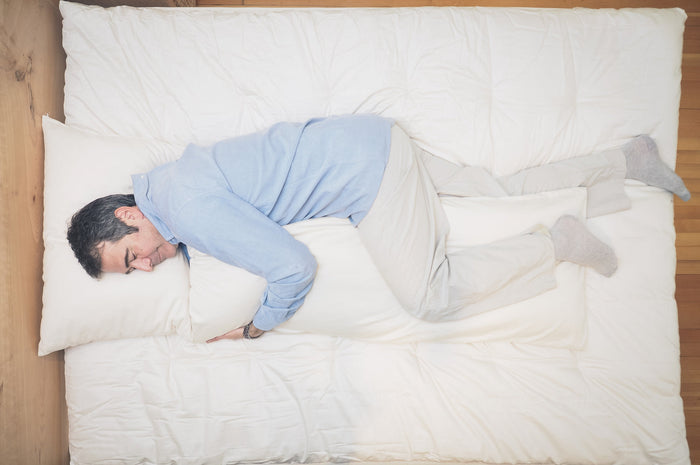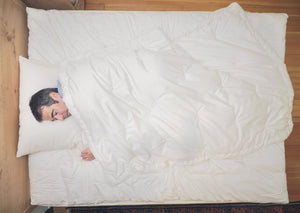All of us have busy lives that lead to frequent later bedtimes or restless nights—hitting snooze on your wake-up alarm more often? You may be suffering from sleep deprivation. Chronic disruptions to normal healthy sleep patterns will render you exhausted and vulnerable to health problems. This article will show you how to recover sleep debt and get the rejuvenating rest your body needs.
In this article:
What is sleep debt?
How much rest do I need?
The dangers of sleep deprivation
How to recover sleep debt
Did you know it could come down to simple math? Sleep debt has us pushing our bodies and nervous systems to levels that often make us sick or feel overwhelmed. We lose two hours of sleep here, a few more there, and all of a sudden, we are down 20 hours over three weeks. A few too many late nights make our sleep unproductive and not as healing as possible. We cannot easily quantify how much damage is done, but we can minimize any damage by making calculated decisions and treating our sleep as the most important thing during our busy lives. Then, we can add the necessary rest and sleep back in, to counterbalance the sleep debt created.
Regular hours of consistently deep revitalizing sleep are necessary for optimum physical and mental health. When life presents its challenges and changes, however, we don't get enough rest. Ongoing sleep deficit, also called sleep debt, can not only endanger your ability to make decisions and concentrate, but it can also put you at risk for a variety of severe health issues.
Is it possible to catch up and repair the damage from sleep debt?
The short answer is, "yes!"
Let’s examine why we accumulate sleep debt and what sleep deficit means to our health. We will learn ways to recover lost sleep and even "bank" some for the future.
What is sleep debt?
The Sleep Foundation defines sleep debt as the difference between the amount of sleep someone needs and the amount they get.
If, for example, your body needs eight hours of sleep per night but only gets six - you have two hours of sleep debt. And sleep debt, like most liabilities, accumulates. So, if you get behind in your required sleep by thirty to sixty minutes each night, you are many hours behind on your rest in a few days.
How much rest do I need?
According to MedlinePlus, the amount of sleep you need depends on several factors that include your age, lifestyle, and health.
The general recommendations for sleep are:
- Newborns: 16–18 hours a day
- Preschool-aged children: 11–12 hours a day
- School-aged children: At least 10 hours a day
- Teens: 9–10 hours a day
- Adults (including older adults): 7–8 hours a day
The dangers of sleep deprivation.
Chronic sleep deprivation causes irritability, difficulty concentrating, anxiety, and depression.
Sleep deficit also increases your risk of developing:
- Heart disease
- High blood pressure
- Stroke
- Type 2 Diabetes
- Kidney disease
- Obesity
Sleep deprivation impairs our ability to think and act quickly. For example, fatigue is the cause of over 100,000 automobile accidents a year in the US. And sleep deficit is behind many workplace accidents and injuries.
These workplace accidents can have dire consequences. For example, in a Swedish study of over 50,000 workers, those who self-reported disturbed sleep were twice as likely to die in an accident related to the workplace.
Chronic sleep deprivation can also affect your appearance.
Sleep debt is quickly evident in the face. Skin tone becomes sallow, dark under-eye circles form, and eyes are red and puffy. When you don't get enough sleep, your body releases more of the stress hormone cortisol. In excess amounts, cortisol can break down skin collagen, the protein that keeps skin smooth and elastic.
Healthy amounts of sleep help support hormonal growth, build muscle mass, build immunity, and repair cells. Adequate sleep improves judgment and even libido! Our skin and facial features are restored. Sleep is nature's way of ensuring we stay well and safe!
How to recover sleep debt.
The following suggestions will help get you on track to recover and even "bank" some sleep!
Practice good sleep hygiene:
- Take steps to keep to a consistent sleep schedule. Go to bed 15 to 30 minutes earlier each night until you reach a regular bedtime that works for you. Stick to it.
- Eliminate screen time for two hours before bed. Blue-light from your devices affects your circadian rhythms – the 24-hour cycle that is synchronized with your brain's "clock." The light from your device makes your brain believe it is looking at sunlight and stops your sleep hormone, melatonin, from kicking in. Turning off all the lights helps melatonin do its job of helping you to drift off to sleep. The production and release of melatonin occur with a clear daily (circadian) rhythm, with peak levels occurring at night. So stop looking at your television, laptop, tablet, or phone before you go to sleep.
- Avoid large meals, caffeine, tobacco, and alcohol before bedtime.
- Have a warm bath or shower before you turn in.
- Sleep in a dark, well-ventilated room.
- If you work night shifts and sleep during the day, wear earplugs and a sleep mask.
- Stay hydrated. Many of us don’t drink enough water. Start the morning with a full glass of water and keep going from there.
- Create a delicious sleep environment. Make your bed and bedroom a luxurious sanctuary with organic linens, a mattress topper, and a body pillow. Investing in a mattress, pillow, and bedding that are suited to your personal needs may reduce discomfort overnight and lead to better sleep.
- Consider a weighted blanket for its calming benefits.
- Enjoy lots of cuddles and hugs with loved ones or a snuggly body pillow. Hugging and cuddling releases oxytocin (the happy hormone), which relaxes us and creates a feeling of calm.
Banking some sleep:
- Catching up on sleep on the weekends is not the best idea because it doesn't work in the long term. Instead, plan to go to bed an hour earlier than usual a few times each week. Just have an extra hour though, no more, or you will upset your new routine. If you can do this twice a week, you will have a couple of spare hours to your sleep debt credit.
- Take a 20-minute power nap each day. If you can't fall asleep during nap time, the focus on rest will be meditative and therapeutic.
- Just say no. If you said no to two events that meant two late nights, by staying home and going to bed early, you would save those hours. You'll soon see how quickly the sleep credits accumulate.
- Ask for support. Share your sleep experiences with those around you. The more we talk and connect about sleep, the better we understand that we are all not so different from each other. So, let's support each other in acknowledging the importance of sleep.
Sleep debt pushes our bodies and nervous systems to levels that often cause illness and anxiety, so start an action plan that will help you recover your sleep debt.
Sleep is the ultimate healer; we will be healthier and happier when we respect our need for sleep's rejuvenating qualities.
Sweet dreams!





















